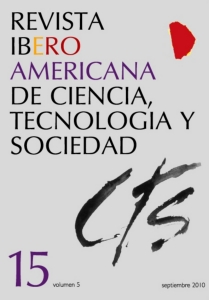¿Democratizar la Ciencia?
Diálogo, reflexividad y apertura
DOI:
https://doi.org/10.52712/issn.1850-0013-820Palavras-chave:
democratización, ciencia, diálogo, reflexivilidad, aperturaResumo
En el discurso político, así como en el académico, diálogo, reflexivilidad y apertura se identifican generalmente como características definitorias de la “democratización de la ciencia”. Este artículo es una reflexión sobre cómo esas tres características se relacionan y funcionan en el discurso y en las prácticas sobre democratización de la ciencia. En esta reflexión la autora argumenta desde tres perspectivas: “Desde ahí fuera”, atendiendo a procesos políticos reales de democratización de la ciencia; “desde aquí dentro”, en perspectivas académicas; “desde allí dentro”, en la posición de un investigador involucrado en la puesta en práctica y organización de ejercicios de democratización de la ciencia. En líneas generales, se argumenta que aun existiendo un discurso común sobre “democratización de la ciencia” (definida en términos de diálogo, apertura y reflexivilidad), las interpretaciones son múltiples y frecuentemente controvertidas. Diferentes valores y motivaciones están en la base de esta diversidad de interpretaciones. En ejercicios participativos concretos, apertura, diálogo, pluralidad, transparencia y reflexividad deberían funcionar como principios regulativos que orientan las prácticas, sin ser objetivos rígidos fijados de antemano.
Downloads
Referências
BECK, U., A. GIDDENS y S. LASH (1994): Reflexive modernization. Politics, tradition and aesthetics in the modern social order, Stanford, Stanford University Press.
BINIMELIS, R. y R. STRAND (2009): “Spain and the European Debate on GM Moratoria vs Coexistence”, en A. Guimarães Pereira y S. Funtowicz (eds.): Science for Policy: Oportunities and Challenges, Oxford University Press, pp. 120-135.
COLLINS, H. y R. EVANS (2002): “The third wave of science studies. Studies of expertise and experience”, Social Studies of Science, vol. 32, nº 2, pp. 235-296.
DELGADO, A., K. LEIN-KJØLBERG y F. WICKSON (en prensa): “Public engagement coming of age: From theory to practice in STS encounters with nanotechnology”, Public Understanding of Science.
EUROPEAN COMMISSION (2001): White Paper on Governance, disponible en formato electrónico en http://ec.europa.eu/governance/white_paper/index_en.htm
EVANS, R. y A. PLOWS (2007): “Listening without prejudice? Re-discovering the value of the disinterested citizen”, Social Studies of Science, vol. 37, Nº 6, pp. 827-853.
FISHER, F. (2000): Citizens, experts, and the environment: the politics of knowledge, Durham y Londres, Duke University Press.
FUNTOWICZ, S. Y J. RAVETZ (1993): “Science for the post-normal age”,Futures, vol. 25, nº 6, pp. 735-755.
HAJER, M. (1995): The politics of environmental discourse: ecological modernization and the policy process, Oxford, Oxford University Press.
IRWIN, A. (1995): Citizen Science: a study of people, expertise and sustainable
development, Londres y Nueva York, Routledge.
IRWIN, A. (2001): “Constructing the scientific citizen: science and democracy in the biosciences”, Public Understanding of Science, Vol.10, nº 1, pp. 1-18.
IRWIN, A. (2006): “The politics of talk: coming to terms with the ‘new’ scientific governance”, Social Studies of Science, vol. 36, nº 2, pp. 299-320.
JACOBY, J. (2004): “GM Nation? Debate”, Heredity, vol. 92, nº 135.
JASANOFF, S. (1995): Science at the bar: Law, science and technology in America, Cambridge, MA, Harvard University Press.
JASANOFF, S. (2003): “Technologies of humility: citizen participation in governing science”, Minerva vol. 41, pp. 223-244.
JASANOFF, S. (2005): Designs on nature. Science and democracy in Europe and the United States, Princenton, Princenton University Press.
LEACH, M., I. SCOONES y B. WYNNE (2005): Science and citizens: globalization and the challenge of engagement, Londres, Zed Books.
LENGWILER, M. (2008): “Participatory Approaches in Science and technology. Historical origins and current practices in critical perspective”, Science Technology and Human Values, vol. 33, nº 2, pp.186-200.
LEVIDOW, L. y S. CARR (2007): “GM crops on trial: Technological developments as a real world experiment”, Futures, vol. 39, pp. 408-431.
MICHAEL, M. (2009): “Publics performing publics: of PiGs, PiPs and politics”, Public Understanding of Science, vol.18, pp. 617-631.
NOWOTNY, H. (2007): “How many policy rooms are there? Evidence-based and other kinds of science policies”, Science, Technology and Human Values, vol. 32, nº 4, pp. 479-490.
NOWOTNY, H., P. SCOTT y M. GIBBONS (2001): Re-thinking science: knowledge and the public in an age of uncertainty, Londres, Polity Press.
STIRLING, A. (2008): “‘Opening up’ and ‘Closing down’. Power, participation and pluralism in the social appraisal of technology”, Science, Technology and Human Values, vol. 33, nº 2, pp. 262-294.
WYNNE, B. (1996): “May the sheep safely graze? A reflexive view of the expert-lay knowledge divide”, en S. Lash., B. Szerszynski y B. Wynne (coords.): Risk, environment and modernity: Towards a new ecology, Londres, Sage, pp. 44-84.
WYNNE, B. (2006): “Public engagement as a means of restoring public trust in science - Hitting the notes, but missing the music?”, Community Genetics, vol. 9, nº 3, pp. 211-220.
WYNNE, B. y U. FELT (2007): Taking the European Knowledge Society seriously, Report of the Expert Group on Science and Governance to the Science, Economy and Society Directorate, Directorate-General for Research, Comisión Europea.
Downloads
Publicado
Como Citar
Edição
Seção
Licença
Copyright (c) 2025 CC Attribution 4.0

Este trabalho está licenciado sob uma licença Creative Commons Attribution 4.0 International License.
Todas os números de CTS e seus artigos individuais estão sob uma licença CC-BY.
Desde 2007, a CTS proporciona acesso livre, aberto e gratuito a todos seus conteúdos, incluídos o arquivo completo da edição quadrimestral e os diversos produtos apresentados na plataforma eletrônica. Esta decisão é baseada no entendimento de que fornecer acesso livre aos materiais publicados ajuda a ter uma maior e melhor troca de conhecimentos.
Por sua vez, em se tratando da edição quadrimestral, a revista permite aos repositórios institucionais e temáticos, bem como aos sites pessoais, o autoarquivo dos artigos na versão post-print ou versão editorial, logo após da publicação da versão definitiva de cada número e sob a condição de incorporar ao autoarquivo um link direcionado à fonte original.











